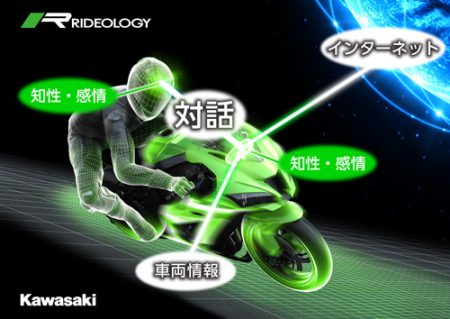August 30, 2016 – Riders of motorcycles already have a signficant bond with their machines. But if Kawasaki succeeds with upcoming models, riders will be able to talk to their bikes and emotionally bond with them.
How is that possible?
Kawasaki is developing what it calls the Kanjo Engine. Now Kanjo is not officially a Japanese word meaning anything. The closest reference I can find is an series of roads located in Osaka called the Kanjo Loop or Kanjozoku, used by after hour street racing enthusiasts. But if Google Translate is right, it refers to an “emotion engine with a natural language interface.” In other words the operator of the bike would be able to talk to it and its software would understand and react appropriately based on the request.
Even more intriguing about the Kanjo Engine is its ability to talk back making suggestions to its operator for a safe and more enjoyable ride. As the bike operator uses it the vehicle’s artificial intelligence (AI) will develop a profile of the rider and automatically adjust settings accordingly. Kawaski calls this capability “rideology.”
For novice motorcycle purchasers and operators, owning a high-end Kawaski model with AI on board should produce an immediate quality driving experience that over time will become even better as the machine and rider bond.
The AI technology Kawasaki has incorporated is developed by Aldebaran, a French software and robotics company. Aldebaran developed the Pepper robot released in Japan by Softbank in 2015. Thousands of Peppers have sold to Japanese consumers who have adopted this robot and describe it as fun and puppy-like.
The “rideology” AI is not exclusive to Kawaski. Softbank has a joint venture with rival Honda aimed at producing similar capability for its mobile transportation products including motorcycles and cars.









